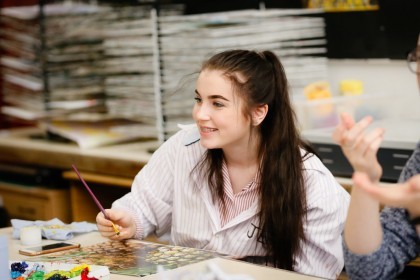Dick Moore’s engaging and poignant talks to BGS students, parents and teachers about teenage mental health reminded us all to cherish that which matters most in life, namely each other. One presentation included the phrase ‘well-being is a prerequisite of academic excellence’ which neatly reflected our school values of happiness and excellence, and the emphasis we place on pastoral care and student welfare.
Honest effort, a job done properly and self-worth complement each other. In this context it is encouraging to note that ‘happiness’ is one of the key words that parents, pupils and staff alike have associated most strongly with BGS in our recent brand research and parental survey.
Interestingly, a ‘Reason to be cheerful: happiness gene is in Britain’s DNA’ was also front page news in last Friday’s edition of The Times. This piece suggested that some countries may be happier than others (cue national stereotypes) thanks to their genes. Read on, and it appears that we cheerful Brits, or at least some of us, when you unpack the detail, have within our DNA the ‘happiness gene’ like other top ranking countries in international well-being polls.
Questions came to mind. To what extent do our genes influence our happiness? Can the same question about our genetic code be applied more broadly to other aspects of our behaviour and our achievements? Does any of this add to the ‘nature vs nurture’ or ‘genes vs environment’ debates that have been ongoing for some time? And, more importantly – what are the implications for education?
The vast majority of teachers tend to be wary about the suggestion that a young person’s intellectual potential/capacity to learn or developing ability is determined by their genes. I share this unease with the notion of ability as a fixed trait, wanting to believe instead that a healthy home school partnership and effective teaching enables learners to excel and exceed expectations, to break the shackles, if they exist at all, of biological inheritance. Teachers add value to their students in lots of ways, not just academically, and learning is limitless with the right encouragement.
Within this context of providing the ‘right encouragement’ we may wish to nod our caps once again to the insights of Professor Carol Dweck, Stanford University and her followers. They advocate on behalf of the Growth Mindset approach to education that can be developed through dedication and hard work – brains and talent are just the starting point. This challenges the concept of fixed, predetermined intelligence characterised by some as a Closed Mindset theory of learning.
In a November 2015 edition of the Times Educational Supplement (TES), Robert Plomin, Professor of Behavioural Genetics at King’s College London went on to suggest that Growth Mindset theory has been ‘greatly overplayed’ arguing that the psychological trait of persistence was about 30 to 50 per cent attributable to genetic influence. This wasn’t an attack, more a plea for balance.
This got me thinking that the potential influence of our genes on learning (and happiness) raises important questions for teachers that challenge much accepted wisdom. Regardless, I continue to believe that Dweck’s insights have significant value.
At the moment however, I’m not so inclined to model a Growth, Closed or Fixed Mindset in education, but more of an Open Mindset approach. And I have to admit that a couple of sentences in the TES did encourage me to believe in Plomin. He suggested that statistically the brightest children are born to parents of average intelligence – I look at myself in the mirror and perceive that there might be some hope for my kids yet!
“Honest effort, a job done properly and self-worth complement each other. In this context it is encouraging to note that ‘happiness’ is one of the key words that parents, pupils and staff alike have associated most strongly with BGS in our recent brand research and parental survey.”
